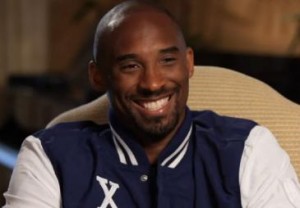 Although the current Olympic team won’t cause quite the eruption of the Dream Team in 1992, fans in Barcelona will be quite enthusiastic when Team USA plays exhibition games Sunday against Argentina and Tuesday against Spain.
Although the current Olympic team won’t cause quite the eruption of the Dream Team in 1992, fans in Barcelona will be quite enthusiastic when Team USA plays exhibition games Sunday against Argentina and Tuesday against Spain.
The difference in focus and expectations from 1992, however, are profound. International fans were mesmerized by the Dream Team and couldn’t get enough of their American basketball idols. But never in their wildest dreams did anyone from another country think their team would beat the greatest players in the world.
That will not be the case the next few days. The Americans will still be cheered. The popularity of the league is at an all-time high and fans love star players. Jerseys with “Bryant” and “James” on the back will undoubted sprinkle the stands during games.
But the home fans in Spain believe their team – featuring the Gasol brothers, Pau and Marc; Oklahoma City’s fabulous shot-blocker, Serge Ibaka; and six other players with NBA experience – can defeat the U.S. in the Olympics.
Argentina did exactly that in 2004 and went on to become the first non-American team to win a gold medal since NBA players began playing in the Olympics in 1992. Their players are not even remotely intimidated.
Even if Team USA gets two victories in the next three days, the challenge of the Olympics will still be ahead. It will leave Barcelona on a mission with few memories of exhibition games. When the Dream Team left Barcelona, the mission was complete and it was blessed with a lifetime of memories.
It’s been 20 years since Michael, Magic, Larry, Charles & Company conquered the world in Barcelona – and also 20 years since I was there writing about that special time. As we continue commemorating the anniversary of the Dream Team, here are 20 memories of Barcelona in the summer of 1992.
1. Barcelona is one of the great cities in the world. Obviously. Otherwise, the Olympics would not have been there. But those of us covering the team had spent a week in Monte Carlo at a luxury hotel across the street from the beach on the Mediterranean. When I got to Barcelona, I discovered my employers had relied on a young exchange student who was fluent in Spanish to find housing for us in Barcelona. You know the type of place a young student will live? It was, to be gentle, modest.
2. Since I was busy working in Monte Carlo, I was the last of those from my newspaper to arrive in Barcelona. All the bedrooms had been claimed. The only thing left was a sitting room next to the bathroom. It was an open room. To get to the bathroom, everyone had to walk through my room. The bed was a piece of wood with four legs and a mattress no more than two inches thick. There were no box springs. That’s where I slept the next two weeks. Yes, covering the Olympics is a privilege. I reminded myself of that many times.
3. The opening press conference at the Olympics is always entertaining because many international journalists do not cover basketball. Indeed, at the 1996 opening press conference, Karl Malone was asked why a basket counted two points. There were number of amusing moments in 1992, including when Michael Jordan was asked how it felt to be called a god. Jordan had a difficult time responding but finally said, “That’s one of the compliments that I really don’t know how to take.”
4. A few minutes later, Charles Barkley was asked why the U.S. team did not stay at the Olympic village. Barkley pointed out that other athletes, like sprinter Carl Lewis, had stayed at hotels or private residences in the past. But then he said, “We’ve got God on our team. We couldn’t stay [in the village]. We’re gonna stay where God wants us to stay. Ain’t that right, Michael?”
5. Barkley, of course, had his famous one-liner when asked about Team USA’s first opponent – “I don’t 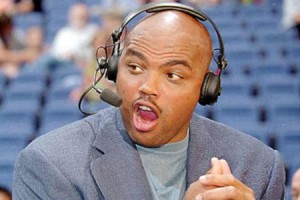 know nothin’ about Angola, but Angola’s in trouble.” But one that drew more laughter was when he was asked how fair it was that games were going to be so one-sided. To the other teams, Barkley said: “Why don’t they just take their ass-whupping like people and go home.” (Ed. Note: My newspaper edited “ass” out of my article. A sign of the times.)
know nothin’ about Angola, but Angola’s in trouble.” But one that drew more laughter was when he was asked how fair it was that games were going to be so one-sided. To the other teams, Barkley said: “Why don’t they just take their ass-whupping like people and go home.” (Ed. Note: My newspaper edited “ass” out of my article. A sign of the times.)
6. Although the Ambassador hotel where the Dream Team stayed was generously described as “a luxury hotel,” it was anything but that. Construction had been completed only a few days before the team arrived. Players complained about paper-thin walls and one player staying close to Jordan’s rooms said Jordan’s kids were quite loud and were not encouraged to be quiet. The only luxury thing about the hotel was the price – $900 per night. Players were given one room and told they could pay for another. Karl Malone’s wife told a group one day that they settled on one room “because we can’t afford another one.” Malone cleared his throat and said, “Excuse me. We can afford it. We’re just not going to pay that kind of money for a little room.” Mrs. Malone stood corrected.
7. By 1992, the Larry Bird League was a regular part of the fantasy game schedule. I had started the league after reading Bird’s system of ranking players in the Boston Globe. Add points, rebounds, assists, steals and blocks and subtract missed field goals, free throws and turnovers. After reading the article, I told Bird the next season I was using his system and could he please choose the draft order. It became a tradition.
8. Bird was always conversational about the league. He’d ask how it worked and who was in it. Other players found out about it and after our draft, they often asked where they had been selected. The day after I got to Barcelona, six of us formed a league – me, Brian McIntyre and Terry Lyons of the NBA, Jack McCallum of Sports Illustrated, John Marvel, who was working for a Bay Area newspaper and the late Matt Dobek, the Pistons PR director.
9. We were at the hotel lobby bar, which had only about six stools, and Bird and a couple of his buddies from Indiana were drinking beers a few seats away. We got a sheet of paper, tore it into six pieces, wrote the names on it, put it in a baseball cap and I walked toward Bird. He turned, started picking the chits out of the hat, finished, turned back to his friends and continued his conversation. Neither one of us said a word. He knew his job.
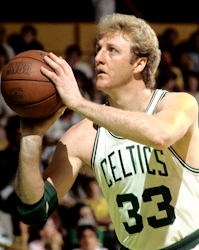 10. I still have the paper we used to record the draft. The U.S. was so loaded that it was not wise to take the players too high. The first six drafted were Arvydas Sabonis and Sarunas Marciulionis of Lithuania, Detlef Schrempf of Germany, Jordan, Oscar Schmidt of Brazil and Drazen Petrovic of Croatia. Here is where the Dream Teamers went in the draft – Barkley (8), Malone (9), Scottie Pippen (14), Chris Mullin (15), Clyde Drexler (19), Magic Johnson (26), Patrick Ewing (34), David Robinson (35), Bird (43), Christian Laettner (59). John Stockton was recovering from a broken bone in his leg and was not drafted.
10. I still have the paper we used to record the draft. The U.S. was so loaded that it was not wise to take the players too high. The first six drafted were Arvydas Sabonis and Sarunas Marciulionis of Lithuania, Detlef Schrempf of Germany, Jordan, Oscar Schmidt of Brazil and Drazen Petrovic of Croatia. Here is where the Dream Teamers went in the draft – Barkley (8), Malone (9), Scottie Pippen (14), Chris Mullin (15), Clyde Drexler (19), Magic Johnson (26), Patrick Ewing (34), David Robinson (35), Bird (43), Christian Laettner (59). John Stockton was recovering from a broken bone in his leg and was not drafted.
11. I won the league without having one member of the Dream Team on my team. I had players from Lithuania, Croatia, the Commonwealth of Independent States (consisting of several former Soviet republics), Australia, Brazil, Venezuela, Angola, Spain and China.
12. The day before the Olympics began, I went to the arena where several of the teams were having light practices. I was sitting in the stands when Mavericks GM Donnie Nelson, then with the Warriors and also a volunteer assistant for the Lithuanian team, walked up with a large bag and said, “Wait ‘till you see what I’ve got for you.” He then gave me one of the first tie-dyed T-shirts that the Grateful Dead had designed for the Lithuanians. I told Nelson that the shirts would be popular and he told me there were a limited number but that the team needed money. He then introduced the team manager to me and we negotiated a deal for 10 shirts or parkas for $500. I told fellow journalists about the shirts and they went fast. The Lithuanians were thrilled to have the money.
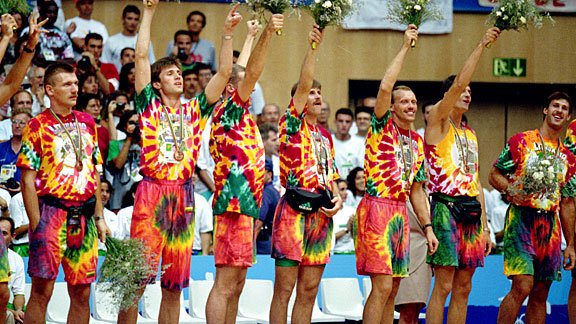 13. In the first game, Angola actually got off to a 2-1 lead and tied the game at 5-5 and 7-7. Then the U.S. scored 31 consecutive points and went on to win the game by 68. Barkley, of course, threw the infamous elbow at 6-6, 174-pound Herlander Coimbra. The funny part of the story is that before the Olympics, I had written a column and said that during the Olympics, someone would get dunked on by Karl Malone and that would be the highlight of his career. That was the result of the hero worship that had taken place at Dream Team games. Eight years after the Olympics, I had a phone interview with Coimbra. He was in Angola and a French interpreter was on the phone helping us. He told me that getting hit by Barkley gave him more recognition than anything else. It was the highlight of his career.
13. In the first game, Angola actually got off to a 2-1 lead and tied the game at 5-5 and 7-7. Then the U.S. scored 31 consecutive points and went on to win the game by 68. Barkley, of course, threw the infamous elbow at 6-6, 174-pound Herlander Coimbra. The funny part of the story is that before the Olympics, I had written a column and said that during the Olympics, someone would get dunked on by Karl Malone and that would be the highlight of his career. That was the result of the hero worship that had taken place at Dream Team games. Eight years after the Olympics, I had a phone interview with Coimbra. He was in Angola and a French interpreter was on the phone helping us. He told me that getting hit by Barkley gave him more recognition than anything else. It was the highlight of his career.
14. The second game was against Croatia, and that’s the one where Jordan and Pippen wanted to embarrass future teammate Toni Kukoc, who had been vigorously pursued by Bulls GM Jerry Krause. The insult to Pippen in particular was that Krause refused to give Pippen a new contract because he was saving cap space for Kukoc, who got hammered. He made only 2-of-11 shots and had four points. Afterward, Pippen walked by Kukoc, who was being interviewed by reporters, smiled a big smile and said, “See you later.” For his part, Kukoc was extremely gracious and said, “There is no reason to hate me or something 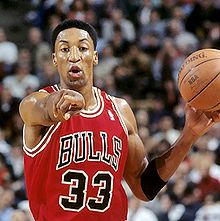 like that. I’m sure that after this game, I have to work 100 percent more if I want to be a real player in the NBA.” Kukoc would wait one more year before joining the Bulls.
like that. I’m sure that after this game, I have to work 100 percent more if I want to be a real player in the NBA.” Kukoc would wait one more year before joining the Bulls.
15. Midway through the Olympics, Magic Johnson had a joint press conference with Juan Antonio Samaranch, the president of the International Olympic Committee. The purpose of it was increased funding for AIDS research. We had to find our way to the site utilizing the subway system. When we got to our stop, we walked up a huge hill and at the top of it was a gigantic armored tank with a soldier sitting atop it while holding a machine gun. Every Olympics has the threat of terrorism, and Barcelona was no different. But on that day, I guess we felt safe. Kind of.
16. My assignment at the Olympics also included covering the women’s team, so I had very few off days. When I did, I usually fought my way through the huge and never-ending crowds that surrounded the team hotel. One day, I was leaving and saw that Julius Erving and another man were walking in front of me. I was interested to see how the Dream Team fans would react to him, but the answer was: Not at all. He strolled through Las Ramblas, the thriving street mall, and was not bothered. There were a few glances because of his height and vague recognition. But for the most part, Dr. J roamed around unbothered, unnoticed and relatively anonymous.
17. Not true for Barkley, who was the most visible member of the team and the most popular – although that obviously had a lot to do with Jordan rarely going out. Barkley drove NBA security mad with his forays into Las Ramblas, but he never had any problems. And he said he could handle himself. Once someone asked Charles what he used for security, and he raised his hands, made them into fists and said, “This is my security.”
18. The Dream Team steamrolled opponents, with no team getting closer than 32 points. Before one of the games in the medal round, Barkley briefly held court and told assembled media they’d better appreciate what they were seeing because it would never be this special again. And he did it in a way that only Charles could do it. “You guys should enjoy this,” he said. “It’s fun. It’s like your first [sexual experience]. You’ll never forget it.”
19. I got to the gold medal game early so I could see the arrival of the Dream Team for the last time. Security had been perfect at the Olympics, but no one was taking a chance at the last game. I described the scene this way: “Eight motorcycles, four police cars, five open vans with rifle-toting soldiers in body armor surrounded the team bus. A helicopter hovered overhead.” After a 117-85 victory over Croatia in the final game, the team did not wait around. They took showers, headed to the airport and before I got back to my room, they were in the air on the way home.
20. In a recent interview promoting his fantastic book on the Dream Team, Jack McCallum said the Olympics ended at a perfect time because the players had been around each other long enough. Physically, there were no problems because the games were not taxing. But everyone was getting mentally fatigued, and that’s when tempers flare. No one even remotely thought about staying behind for the closing ceremonies, which worked out great for me because the NBA had a bunch of tickets that were not going to be used. I had to stay and cover another event but then went to the closing ceremonies as a spectator. Outside the stadium, I found a vendor who sold M&M shirts, and my 6-year-old daughter loved M&Ms. She had to grow into the shirt because it was too large, but she wore it for 10 or so years.
And every time I looked at it, there were great memories.
Jan Hubbard has written about basketball since 1976 and worked in the NBA league office for eight years in between media stints. Follow him on Twitter at @whyhub.
Great write up.